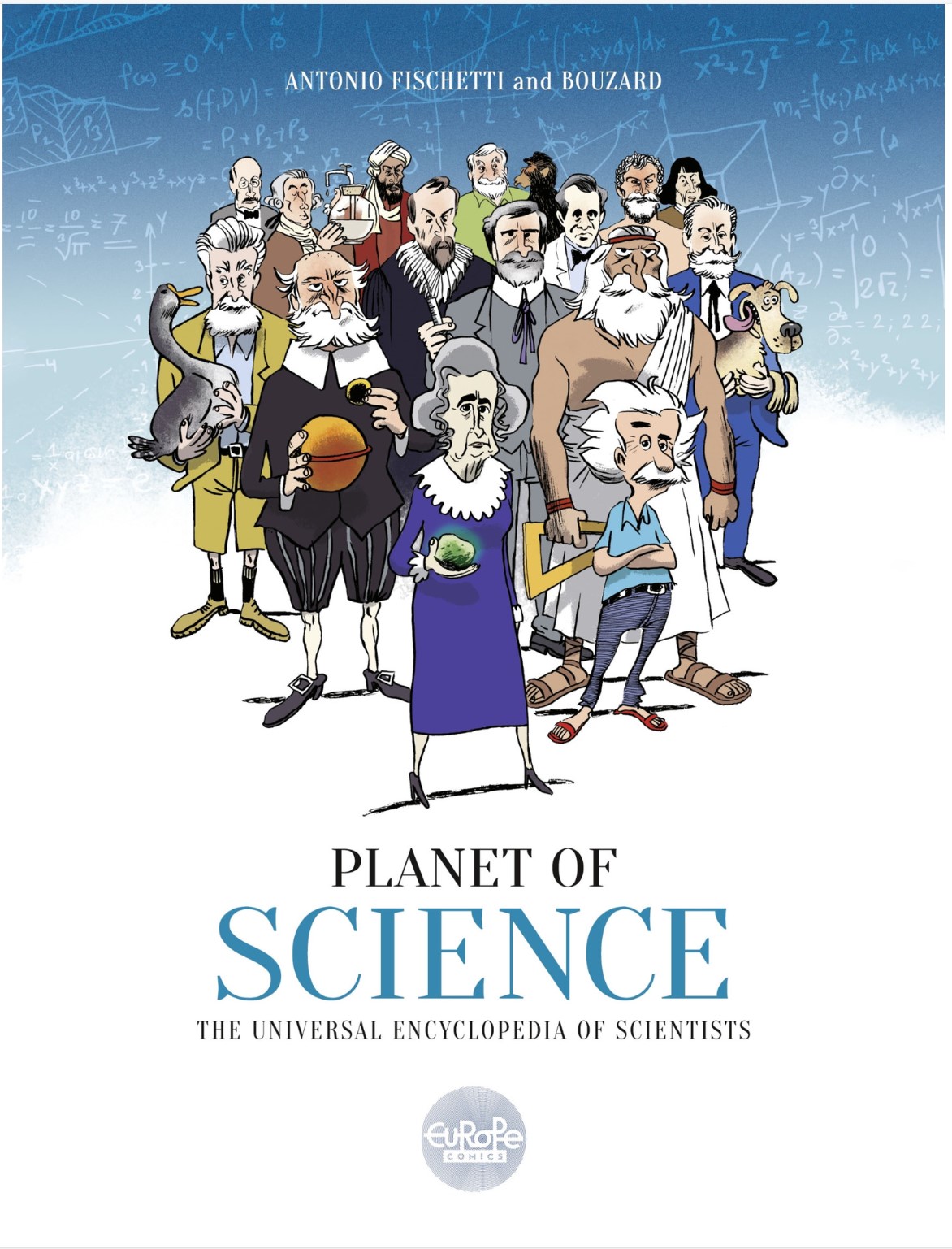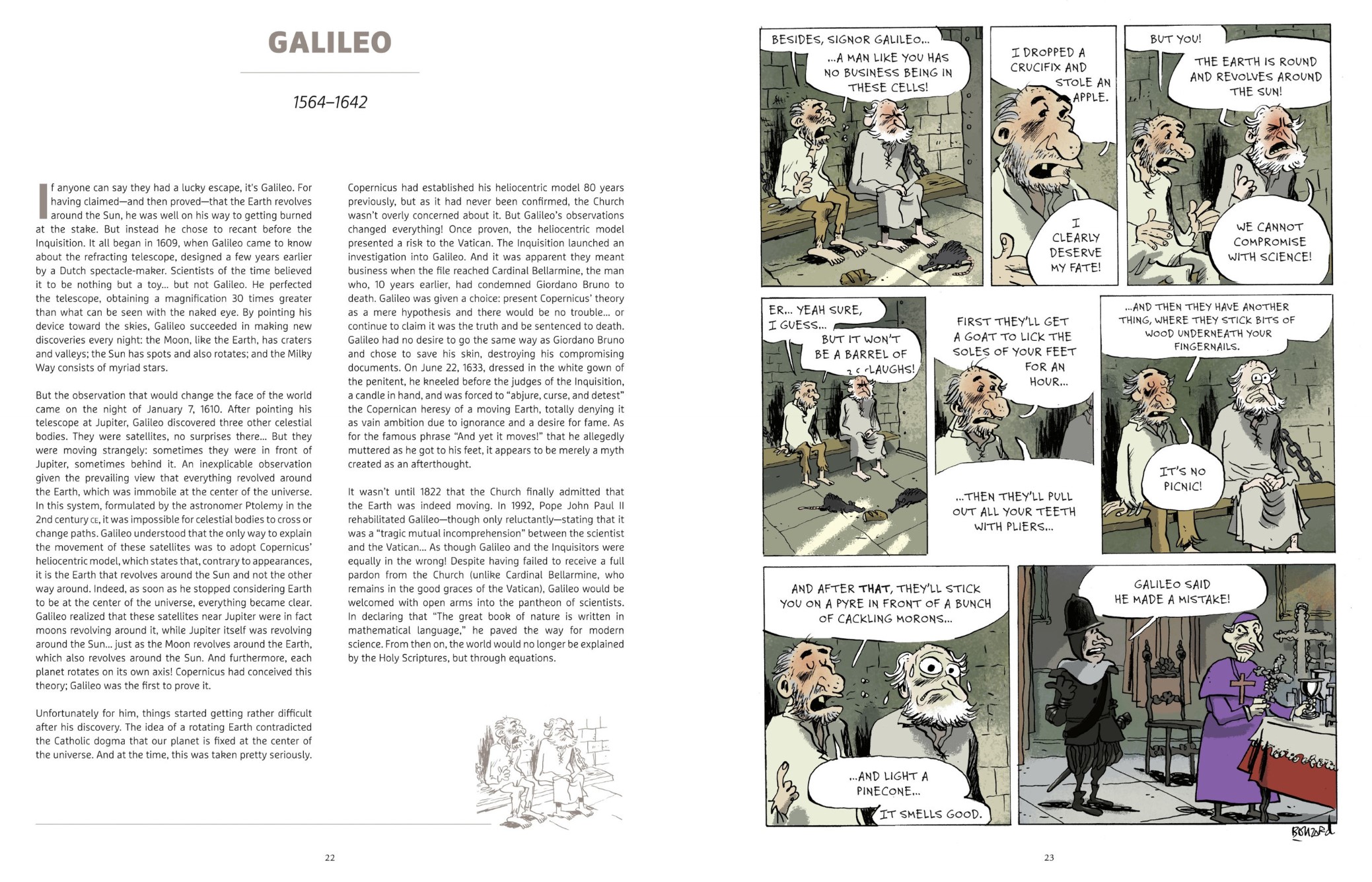
By Antonio Fischetti & Bouzard, translated by James Hogan (Europe Comics)
No ISBN: digital only
Comics and graphic novels have an inconceivable power to deliver information in readily accessible form, and – like all the best teachers – can do so in ways that are fascinating, fun and therefore unforgettable.
A prime example is 2019’s La Planète des sciences – Encyclopédie universelle des scientifiques – which is available digitally in English if STILL not yet as a solidly reassuring tome. A bright and breezy introduction to a number of researchers and discoverers, famed and not, it combines a page of personal history, biography and unflinching commentary on 37 notable personages who have added to global scientific knowledge, each accompanied by a smart, punchy and pertinent gag strip by underground cartoonist Guillaume Bouzard (Caca bemol, Je veux travailler pour le Canard enchaîné, Lucky Luke).
Presenting the facts is Dr Antonio Fischetti, author (Cats and Dogs under the scientist’s magnifying glass, Idiotic and Relevant Questions about Mankind); science journalist; educator (at the National Conservatory of Arts and Crafts, National Conservatory of Music and Dance in Paris, Louis Lumière School and La Femis); and author of a science column for illustrious truth-seeking organ Charlie Hebdo.

The Continent is happily, gloriously awash with factual albums and graphic novels – and not just biographies – and this is one of the most entertaining I’ve ever seen, opening with Dr. Fischetti’s explanatory postulate on why these particular 37 candidates and his cognitive methodology, before the visual revelations begin. Sub-divided into rough, often overlapping time frames it all starts in Ancient Greece with the lowdown and high points of Thales, Pythagoras, Hippocrates and Archimedes, before jumping to 780-850CE for the story of Al-Khwarizmi.

Traversing the 15th – 16th Century, we meet Leonardo da Vinci, Nicolaus Copernicus, Ambroise Paré, Giordano Bruno & Galileo, before 17th – 18th Century pioneers Rene Decartes, Antonie van Leeuwenhoek, Isaac Newton, Carl Linnaeus and Antoine Lavoisier get their moment in history’s hindsight and spotlight. As big, deep thinking becomes more widespread, representing the 19th Century are Charles Darwin, Claud Bernard, Gregor Mendel, Louis Pasteur, Alfred Nobel (suck it, Donny-baby!) and Dmitri Mendeleev, after which the revolutionary 19th – 20th Century hones in on Ivan Pavlov, Max Planck, Marie Curie, Albert Einstein, Alfred Wegener, Alexander Fleming, Erwin Schrödinger and Trofim Lysenko. By now it’s probably clear to most of you that this is no simple hagiography: some of the folk here are included because of their effect on scientific progress and it’s not all smiles, acclaim and awards…
The procession of progress pauses with the 20th – 21st Century (because, as of this writing, time travel has not been satisfactorily confirmed or reproduced under laboratory conditions) with controversial and occasionally still-living paragons Konrad Lorenz, Alan Turing, Alexander Grothendieck, James Watson, Peter Higgs, Yves Coppens, Emmanuelle Charpentier and the recently lost and already hugely missed Jane Goodall. Sure, you could Google them, but this book is a far more satisfying alternative…

The very fact that you probably haven’t heard of some of these latter savants – or even a few of the more ancient ones – only proves without doubt that you need this book. QED: What more can one say?
© 2020 DARGAUD – Fischetti & Bouzard. All rights reserved.
Today in 1913, comic book pioneer, cover artist and co-creator of Zatara Fred Guardineer was born, whilst in 1924 the legendary Harvey Kurtzman took his first peep at reality and probably started taking critical notes. We last spotlighted the inventor of Mad Magazine in Harvey Kurtzman’s Marley’s Ghost.
And today in 1982 the world was lessened by the passing of wondrous Noel Sickles, whom we loved most for such astounding strip work as Scorchy Smith: Partners in Danger.
